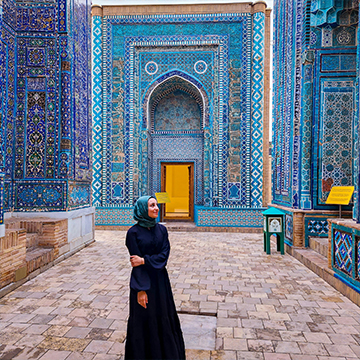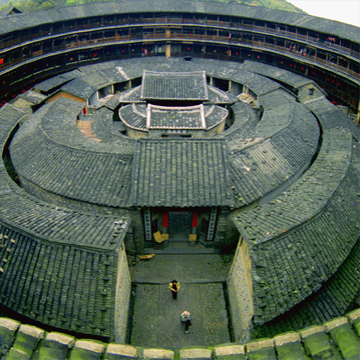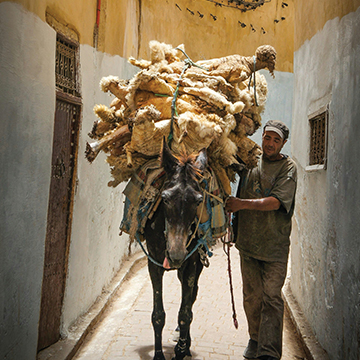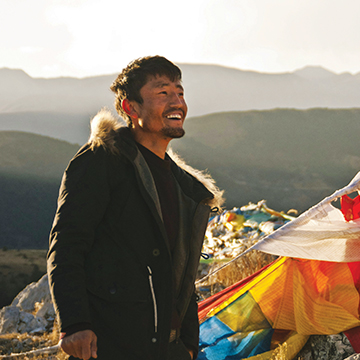The Pathway of Peace in Isaiah

“In that day there will be a highway from Egypt to Assyria. The Assyrians will go to Egypt, and the Egyptians to Assyria. The Egyptians and Assyrians will worship together. In that day, Israel will be a blessing alongside Egypt and Assyria. The Lord Almighty will bless them, saying, ‘Blessed be Egypt my people, Assyria my handiwork, and Israel my inheritance.’” (Isaiah 19:23-25, NIV)
The New Middle East Corridor
On September 22, 2023, at the 78th United Nations General Assembly, Israeli Prime Minister Benjamin Netanyahu used a red marker to draw a line across a map of the “New Middle East.” He explained that this line represented a pathway for peace and prosperity, connecting Israel, Saudi Arabia, and other neighboring countries. This corridor, he said, would dismantle old barriers and create a passage linking Asia to Europe—traversing the UAE, Saudi Arabia, Jordan, and Israel.
On the map, countries like the UAE, Saudi Arabia, Bahrain, Jordan, Egypt, and Sudan are marked in green. However, the West Bank, East Jerusalem, and Gaza are notably absent. Once the map was made public, it drew sharp criticism, with opponents accusing Israel of sidelining Palestinian territories and naively believing it could secure support from the Arab world.
In 2020, Israel initiated the Abraham Accords, securing peace agreements with four Arab nations in just three years. By September 2023, Saudi Arabia appeared on the verge of joining, with only final details left to negotiate. If Saudi Arabia, a leading power in the Arab world, were to recognize Israel, it would signal that the Arab League might largely abandon the Palestinian cause. Even if some countries continued to voice their support for Palestine, their influence would be minimal.
Less than a month later, on October 7, Hamas launched a surprise attack that shattered this vision. At an electronic music festival in the town of Re’im, located in southern Israel, Hamas militants struck unexpectedly, killing and injuring hundreds and taking dozens hostage. This sudden assault disrupted Israel’s momentum, casting doubt on the dream of a “New Middle East” built on peace and prosperity. As the conflict between Israel and Palestine intensifies, the possibility of restoring that vision seems increasingly unlikely.

The “Highway” in the Book of Isaiah
Isaiah 19 speaks of a “highway” (Hebrew: Mesilah, meaning elevated route) connecting Egypt and Assyria, where Egyptians and Assyrians can travel freely and even worship together. However, the historical context of Isaiah’s time tells a different story. During the reign of King Isaiah, both Israel and Judah were divided and in conflict. Assyria was constantly invading, and Israel sought alliances with Aram in the north, while Judah attempted to make a pact with Egypt to resist Assyria. These strategies ultimately failed. In 722 BCE, Israel was conquered and destroyed by Assyria, and the ten tribes of Israel disappeared.
In light of this history, the “highway” mentioned in Isaiah 19, where “Israel will be a blessing along with Egypt and Assyria,” seemed like an impossible dream. At the time, Assyria, Egypt, and Israel were bitter enemies. Even though Israeli Prime Minister Netanyahu has worked tirelessly to establish new connections in the “New Middle East” corridor, those efforts were quickly undone by a surprise attack from Hamas. The conflict between Israel and Palestine has continued to make waves globally, with Israel’s efforts to ensure its survival through military means facing immense challenges from all sides.
Yet, we believe that God sees these conflicts differently. Isaiah 19 prophesies that the plans of human powers will ultimately fail, and that God will punish Egypt. However, when the Egyptians turn to the Lord and cry out, He will heal and save them: “The Lord will be known to the Egyptians, and they will acknowledge the Lord. On that day, they will make sacrifices and offerings; they will make vows to the Lord and keep them” (Isaiah 19:21). This suggests that even the most resistant nations or peoples will eventually turn to God, albeit in small numbers. When that “day” comes, Egyptians—who once knew not God—will join Assyrians in worshipping Him. Israel will, in turn, be a blessing to Egypt, Assyria, and the nations of the earth.
While we do not know when this “day” will come, Isaiah 19:24 gives us hope. It encourages us to look at the Middle East conflict, as well as the possibility of Jewish and Arab Muslims coming to faith, with new eyes and renewed hope.
The “Highway” from the Perspective of Missionaries
Missionaries G and J, who serve in the Middle East, view the “highway” in Isaiah 19 as both a literal and spiritual pathway. Recently, during their prayer walks in the Gulf countries, they observed that the highways connecting major cities in the Middle East are well-developed and expansive, facilitating easy travel across the region. The doors of the Arab world are also wide open.
“The Middle Eastern countries are actively building and opening their doors to welcome foreigners for work, investment, and tourism. For example, two major projects in Saudi Arabia—the NEOM and Red Sea Project—are creating opportunities for professionals in various fields. In terms of education, Saudi Arabia requires both public and private primary and secondary school students to learn Chinese, offering Chinese teachers a chance to apply and teach there. Furthermore, the second holiest site in Islam, Medina, is now open to non-Muslims and foreigners for visits, allowing us to learn more about the region.”
G and J believe that believers with a heart for the Middle East should take advantage of this opportunity to pray and seek God’s guidance. “The situation in the Middle East is changing rapidly, and we don’t know when these doors may close.”
In recent years, the spiritual winds have been blowing across the Middle East, and many Muslims are coming to faith. G added, “When a large number of Muslims come to Christ, it sparks jealousy among the Jews, and in the end, all of Israel will be saved.” This echoes the prophecy of the highway in Isaiah 19.
Michael Kerem, who has served in Israel for many years, is the director of Derech Avraham Ministry and a member of the Isaiah 19 Highway movement. In a past interview, he offered a concise analysis of the Middle Eastern situation and the urgent need for the gospel. He explained that the “highway” symbolizes hope, reflecting God’s promises, will, and blessings for Israel, the Gentiles, and all nations. “To understand the Middle East, we need to start with World War I,” Kerem explained. “Before the war, the region was part of the Ottoman Empire, which viewed itself as a caliphate. When World War I ended, the Ottoman Empire collapsed, and the region was divided under the Sykes-Picot Agreement, creating the modern Middle Eastern countries. However, these new borders often ignored ethnic and tribal divisions.”
The Sykes-Picot Agreement remains a painful memory for many Arabs. During World War I, two diplomats—Mark Sykes from Britain and François Georges-Picot from France—drew arbitrary borders with a pencil, splitting the Middle East into countries without regard for the ethnic or religious communities that lived there. A century later, the Middle East still suffers from the consequences of this agreement, which many blame for the violence and turmoil in the region, including the Palestinian land issue and the rise of ISIS in Iraq.
Kerem specifically pointed out that the ancient Assyrian empire covered several present-day Middle Eastern countries, and one forgotten people group without a nation are the Kurds, numbering over 35 million, spread across multiple countries. “The Kurds are descendants of the Medes, mentioned many times in the Bible. They play a role in God’s redemptive plan, helping to restore Israel,” he noted, referring to the prophecy of the Jews’ return to their land under the Persian king Cyrus, as foretold in Isaiah 44:28 and 45:1.
“Even though there are many discussions in history, archaeology, and science, the Kurds believe they are descendants of the Medes. The regions they occupy today—northern Iraq, southeastern Turkey, northwestern Iran, and northeastern Syria—are the lands of ancient Assyria.”
Reconciliation of Abraham’s Descendants
“Herds of camels will cover your land, young camels of Midian and Ephah, and all from Sheba will come, bearing gold and incense and proclaiming the praise of the Lord. All Kedar’s flocks will be gathered to you, the rams of Nebaioth will serve you; they will be accepted as offerings on my altar, and I will adorn my glorious temple.” (Isaiah 60:6-7, NIV)
Isaiah is filled with profound prophecies, including this one in chapter 60, where he mentions the peoples of Midian, Ephah, Sheba, Kedar, and Nebaioth. Midian, Ephah, and Sheba were descendants of Keturah, Abraham’s second wife (Genesis 25:2-4), and their descendants formed several Arab tribes. The camels mentioned here are specifically the dromedaries of Arabia and the Near East, known for their unique single hump. Kedar and Nebaioth, on the other hand, were descendants of Abraham’s son Ishmael, born to Hagar (Genesis 25:13). These peoples, too, will come with gifts, worshiping God and joining His people in reverence.
Looking back at the Middle East today, some regions are plagued by violence and conflict, creating a massive refugee crisis, while others have grown incredibly wealthy due to oil, and people live lives of extreme luxury. In Israel, there are numerous factions. The secular Jewish community, many of whom do not believe in God or follow traditional faith, often embrace atheism, secularism, humanism, or even other religions (such as Buddhism, Hinduism, New Age movements, or mysticism). Some believe Israel’s establishment was due to Jewish effort rather than divine intervention.
However, when we read Isaiah’s prophecies and see God’s promises, let us approach them from God’s perspective. We should actively pray for the Middle East and Israel, trusting in the Holy Spirit to move powerfully in the region, that many may come to share in God’s grace and become one family in Christ. Amen!
























































